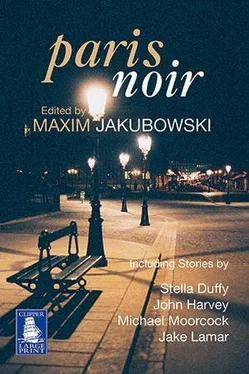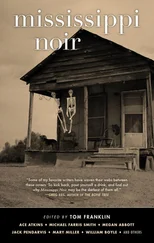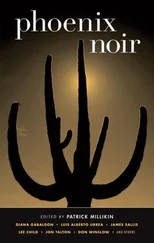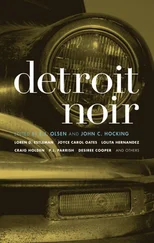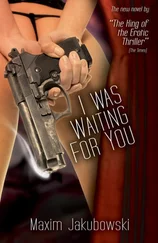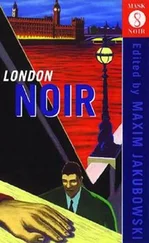Maxim Jakubowski - Paris Noir
Здесь есть возможность читать онлайн «Maxim Jakubowski - Paris Noir» весь текст электронной книги совершенно бесплатно (целиком полную версию без сокращений). В некоторых случаях можно слушать аудио, скачать через торрент в формате fb2 и присутствует краткое содержание. Жанр: Детектив, на английском языке. Описание произведения, (предисловие) а так же отзывы посетителей доступны на портале библиотеки ЛибКат.
- Название:Paris Noir
- Автор:
- Жанр:
- Год:неизвестен
- ISBN:нет данных
- Рейтинг книги:3 / 5. Голосов: 1
-
Избранное:Добавить в избранное
- Отзывы:
-
Ваша оценка:
- 60
- 1
- 2
- 3
- 4
- 5
Paris Noir: краткое содержание, описание и аннотация
Предлагаем к чтению аннотацию, описание, краткое содержание или предисловие (зависит от того, что написал сам автор книги «Paris Noir»). Если вы не нашли необходимую информацию о книге — напишите в комментариях, мы постараемся отыскать её.
Edited by Maxim Jakubowski, the stories range from quietly menacing to spectacularly violent, and include contributions from some of the most famous crime writers from both sides of the Atlantic, as well as the other side of the Channel.
Paris Noir — читать онлайн бесплатно полную книгу (весь текст) целиком
Ниже представлен текст книги, разбитый по страницам. Система сохранения места последней прочитанной страницы, позволяет с удобством читать онлайн бесплатно книгу «Paris Noir», без необходимости каждый раз заново искать на чём Вы остановились. Поставьте закладку, и сможете в любой момент перейти на страницу, на которой закончили чтение.
Интервал:
Закладка:
Aware of her awesome ability to make her fears come true, she gets the idea that she should control her own death by killing herself. At this point, she is without hope, and this plan gives her a certain discipline and purpose. A project. She used to be much better at making her dreams come true – for example, her dream of living one day in Paris brought her to Paris. Now the fears rule, hard as she tries to keep them at bay. All the mistakes, the triumphs, have taught her nothing useful. She has experience now, and is hidebound by it, unable to move in any direction, lacking the same energy and daring she once had to challenge the maze, too prone to analysis – ‘what worked, what didn’t work, how did I do it before’, at the cost of all spontaneity. If experience was wisdom, it was greatly overrated.
The suicide note is the first thing that grabs her in ages, and she writes the initial draft in a frenzy, feeling unshackled from her fears, temporarily. But unfortunately, the fears kick in again as she edits and she can’t stop rewriting the note. Is she being too honest or too obtuse, too easy on herself or too hard? On others? Will people understand why she’d rather die than admit failure and go home? Will they lament the waste of a young talent, or her wasting their time and that of other people by trying to be an artist all these years? After all, what did she have to show for all these years in school and in Paris except a couple of lit mag publications and one article on French words that look like English words but mean completely different things that was printed on page seventeen of a free newspaper for Anglos? She imagines her death notices will read like her rejection slips: ‘over-dramatic’, ‘not much there to interest us’, ‘belaboured ending’.
Soon, she begins fictionalising here and there to make it a better read, and before long, the note isn’t about her any more, but about a man named Harry Waller, who sits down one day and loads a gun with bullets, placing it carefully by the side of a typewriter where he proceeds to write his farewell – the story of a life gone wrong, the love and opportunities lost, the heartbreak that he feels physically, a genuine pain in his heart whenever he thinks of his sad, bad and mad moments, as if these regrets reside in his heart like shards of glass. As he approaches the end of his ten-page suicide note, he suffers a sudden coronary, and instinctively picks up the phone and calls 911. Alas, by the time paramedics arrive, he is dead.
Afterwards, she reads it and decides it is good, not just good but redemptively good. Faith is restored. She spends precious euros at an internet café emailing it to magazines who take electronic submissions and on postage sending it to those that do not. Then she waits, living on street crêpes and water and the certainty that she has turned a corner and the future is wide open. Not only is it a great short story, she thinks, but it would make a great independent film, the note framing Harry Waller’s wild woolly life as an international oil rig salesman, which was much funnier and more interesting than her life.
But it turns out the editors don’t agree it is great, or even agree with each other about why it is not. ‘Too long’, says one. ‘Too short and undeveloped’, says another. ‘Very funny but not right for us’. ’Failed to see the humour’, and so on.
That day she receives the last rejection slip for ’A Short Story about Hope’. She hasn’t eaten in two and a half days and is more than two months behind on the rent, phone and EDF. The man who runs the Manhattan School for Business English in Paris, where she was working black, refuses to pay her the 1,500 euros he owes her. He knows that she can’t do anything about it without revealing her sans papiers status and getting kicked out of France. She wasn’t angry when he fired her – she hated the job and the students, who seemed to think she could do all the work in getting them to understand English, pumping them full of useful English words and phrases while they did nothing, sitting by slack-jawed and dull-eyed like force-fed geese. But she is angry that he won’t pay her what she is owed.
Having been through the gamut of ‘black’ jobs, off the books, which are few, badly paid and usually menial, there remains prostitution and begging – never! – and thievery, which she considers. Back in college, she used to pick pockets as a party trick. There’d be some meaty and easy pickings in some of the tourist areas, like place du Tertre where the crowds jostle with sidewalk artists, who advertise their skills with portraits of celebrities that are at the same time more flattering and less interesting than the originals. But she could only do it if she knew her victim was a greedy despoiler of planet Earth and its people, and that would require an unrealistic amount of research. Otherwise, she was liable to pick someone who looked the part, some big-spending German with a big belly, and worry later he was just an innocent tourist, maybe here for a last vacation before he begins the cancer surgery to remove the watermelon-sized tumour in his stomach. So thievery is out. There are no options other than starve in Paris or find her way back to her home town in Wisconsin to work in the cheese-flavoured foods factory or the Walmart, like her sister Tiff who has sacrificed everything to stay home to look after her mother, who is suffering from some mysterious undiagnosed ailment that keeps her in bed most of the day watching game shows and screaming at CNN.
No, the bottom line is she’d rather die in Paris, she thinks.
But now she feels incapable of writing even a suicide note.
When Anna calls from Oslo, Shay is wondering where her next meal will come from. Literally, she is thinking this when the phone rings, and she hears Anna’s invitation – she has a one-night stopover in Paris, and would Shay join her and some Norwegian friends for dinner that night, her treat?
There seems to be a bit of magic left in her world.
But no money left. The biggest problem now is that the restaurant they are meeting at, Hotel du Nord by Canal St Marttin in the tenth, is way the hell across the city from her apartment near Convention. It is too far to walk in bad shoes, in bad weather – it is a record a breaking winter – too far to walk even in good shoes in good weather, and all she has in her pocket is a used Métro ticket with a smeared date stamp. It has already saved her a couple of tickets for ‘stealing trains’ – not paying the fare, in other words. If the cops stopped her at one of their random underground check stops, she just showed the old ticket and babbled in English and they waved her through.
You couldn’t jump the turnstiles any more, not since they’d all been replaced with electronic turnstiles and six-foot gates. But you could still sneak through if you went right behind someone with a ticket, so close you were touching. It helped if the station was crowded. The trick was picking out someone who wouldn’t mind and wouldn’t rat you out, or someone so preoccupied they wouldn’t notice – people on cellphones, with small children, too many bags, or muttering to themselves. She slips through by helping an African woman struggling with her two tired, dead-weight children. There is no check stop, so she is able to get off without any problem at Jacques Bonsergent and walk the four blocks to Hotel du Nord.
The windows of Hotel du Nord are frosted, it’s so cold outside, but the warm, amber lighting glows through. The cold follows her inside and clings to her like an aura, which makes the maitre d’ shiver when he approaches her. Anna is already there with a male pilot, Peter, and two other, flight attendants for her airline – a gay man, Baard, and another woman, Liv. While waiting for Shay, they’ve already polished off a couple of bottles of wine, so it’s a pretty happy group. Shay gets into the mood, sharing some of her favourite stories about Anna back during Anna’s modelling days in New York, when they had both been twenty-something and beautiful, invited everywhere. There was that night at Elaine’s, a book party for some friend of Anna’s. They’d brushed shoulders with Arthur Miller and Robert Altman, and Jerry Stiller had introduced them to Matt Dillon. Or the night Shay had turned off her phone to write, hearing Anna’s message too late, ‘I’m hanging out with Mick Jagger and Carly Simon at Whiskey. Where are you? Come down.’ There were parties with free food and drinks almost every night, and too many nights dancing after hours at Splash with gay boys. Anna still parties occasionally with glamorous people, but not exclusively – obviously, or Shay, long past glamorous with her two pairs of jeans and three shirts, all fraying, would not be here.
Читать дальшеИнтервал:
Закладка:
Похожие книги на «Paris Noir»
Представляем Вашему вниманию похожие книги на «Paris Noir» списком для выбора. Мы отобрали схожую по названию и смыслу литературу в надежде предоставить читателям больше вариантов отыскать новые, интересные, ещё непрочитанные произведения.
Обсуждение, отзывы о книге «Paris Noir» и просто собственные мнения читателей. Оставьте ваши комментарии, напишите, что Вы думаете о произведении, его смысле или главных героях. Укажите что конкретно понравилось, а что нет, и почему Вы так считаете.
